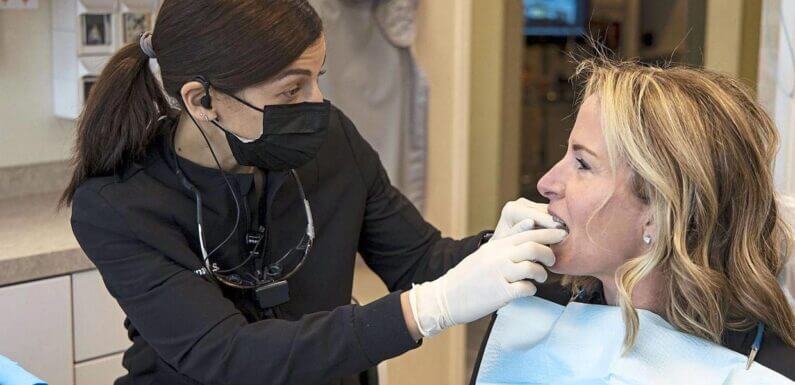
Sudden dental problems can creep up on us and make it impossible to focus on anything else. The human mouth is an incredibly complex biological system, and problems can be caused by the usual culprits like tooth decay, or they can have more subtle underlying causes, such as gastric issues. Due to this, we recommend leaving the diagnosis and treatment to professionals.
If you can’t get to a nearby dentist, here are some common complaints and how to fix them:
Tooth Pain
What Causes It?
Tooth pain is considered the most common dental problem, particularly among young adults. Around 30% of young adults suffer from some form of dental pain. Part of the reason for this ubiquity is the fact that different complaints tend to get clubbed together and are generally referred to as tooth pain. Causes of tooth pain include:
Tooth Decay: Cavities or tooth decay refer to permanent damage caused by bacteria due to infrequent brushing and dietary habits. Cavities start small and can develop extensively if they’re not treated immediately, affecting deeper layers of the tooth.
Luckily, cavities can be dealt with pretty easily in the early stages with fillings. These come in different forms and price ranges, making them affordable for everybody. If left to fester too long, more invasive procedures may have to be performed (e.g. root canal treatment).
Infections: Also known as tooth abscesses, these are related to cavities. If cavities are left open too long, bacteria can enter and form pockets of pus. These can occur both in the gums and the tip of the roots.
Symptoms To Look Out For
- Fever: Patients experience fever in the event of bacteria or viruses entering the body through open cavities.
- Swollen, red gums: Swollen gums are a sign of inflammation and represent a response to bacteria or decay.
- Throbbing pain: This can be representative of a cavity that has advanced a certain amount. Strong and subsistent pain is a definite sign to visit the dentist to get help with tooth pain before the cavity forms an abscess.
Remedies
If you’re left without any source of medical aid nearby, these might offer a temporary respite from the pain. It is strongly recommended, however, that patients should not use these as a long-term remedy as dental problems like cavities require professional help for the actual treatment.
- Tea bags: Black and peppermint tea bags are passable home remedies for pain and even bleeding. They can soothe the pain by numbing the gums and reducing swelling too.
- Over-the-counter medication: Medication like ibuprofen or Tylenol can help reduce mild and moderate pain until you find the chance to visit a doctor. In case your infection or cavity is too severe, you might still experience some pain even after taking these. Patients should be cautious with the dosage and stick to what’s recommended on the packaging as some painkillers can form habits.
- Clove oil: Clove oil is a natural anesthetic due to the presence of eugenol. It’s easy to apply too, just grind out the oil (or buy it from a store), apply it on a cotton swab, and press to the affected area for results.
Bad Breath
What Causes It?
Bad breath, or halitosis, can be a result of tooth decay as well as other physical complications that might be entirely unrelated to your teeth. Bad breath can be a dental problem for the elderly as well as the young and can be embarrassing to disclose to loved ones and even professionals. Some causes include:
- Tobacco usage: Frequent smoking and tobacco usage can create a lingering odor that may persist even after brushing.
- Dental hygiene: An irregular or infrequent brushing and flossing routine can cause a buildup of plaque and bacteria, leading to bad breath.
- Other conditions: Physical conditions like tonsil stones or acid reflux can upset the chemical balance in your body and produce bad breath as a result.
Remedies
Hygiene
Maintaining regular dental hygiene is the first step to curing bad breath, regardless of the cause. Regular brushing and flossing will prevent plaque from building up and even if you don’t have any in the first place, it’ll alleviate the symptoms until the underlying cause is fixed. Consult your dentist for advice on antibacterial toothpaste and brushing your teeth with braces, if you have any.
Gum Treatment
If you’ve noticed your gums receding or turning an unnatural color, it could be a cause for bad breath. Receding gums can create spaces for bacteria to multiply rapidly and are tough to clean without professional assistance and equipment.
Home Remedies
- Water: Regularly drinking water will prevent your mouth from drying out. Inadequate hydration can cause odors to intensify and promote bacterial growth.
- Moderation: Maintaining a healthy diet and staying away from garlic, onion, and fried foods can help reduce bad breath.
- Brushing your tongue: People often overlook their tongue when brushing their teeth. Not cleaning your tongue regularly can promote bacterial growth. If you find that you need additional help, a tongue scraper might come in handy.
Put Yourself First
Tooth pain and gum disease can take over our lives if not treated immediately and tend to dent our self-respect significantly. Most of these diseases can be avoided with a moderate lifestyle consisting of a healthy diet and a regular dental routine. If you do end up experiencing one of these symptoms, make it a priority to visit your closest dentist as soon as you can.
